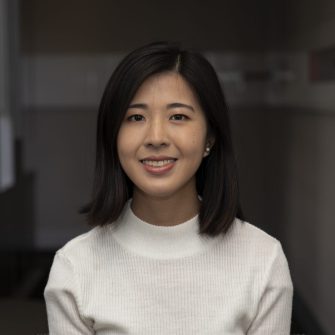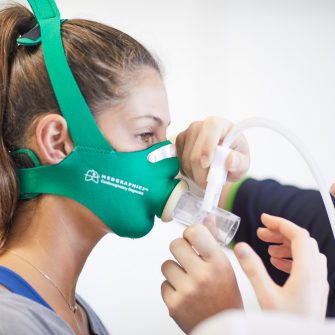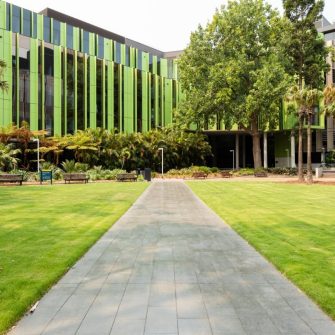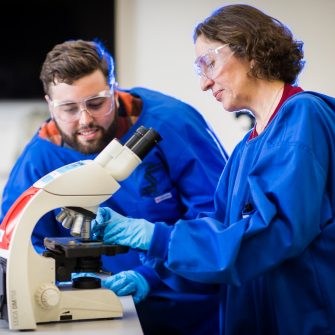Bachelor of Vision Science / Master of Clinical Optometry
- Commencing Terms
- Term 1
- Duration
- 5 Year(s)
- Delivery Mode
- Face-to-face (includes blended)
- Campus
-
Kensington
- Codes
- UAC code 429750
- Program code 3182
- CRICOS code 092960A
-
ATAR/2025 lowest selection rank
- 99.5 View all admission criteria
-
2026 Indicative first year full fee
- $9,000*
-
2026 Indicative full fee to complete degree
- $60,000*
-
2026 Indicative first year full fee
- $63,000*
-
2026 Indicative full fee to complete degree
- $350,000*
Application closures for 2026
International applications for all undergraduate programs, as well as postgraduate programs offered by the faculties of Arts, Design & Architecture, Engineering (excluding Master of Information Technology and associated programs) and Science are now closed to New Overseas Student Commencement (NOSC) for 2026 intakes.
Postgraduate programs offered by the Business School and the faculties of Law & Justice and Medicine & Health remain open. Master of Information Technology (and associated programs) also remain open.
- Overview
- Entry requirements
- What will I study?
- Future careers
- How to apply
- Fees & Scholarships
Overview
We rely heavily on our five senses to navigate life: touch, taste, smell, hearing and sight. Each of these senses plays a vital role in our day-to-day lives. Problems with eyesight can have a profound impact on an individual’s life. Through optometry, many vision problems and eye diseases can be corrected or managed, restoring sight to people from all walks of life.
Optometrists diagnose vision problems, eye diseases and other eye health issues. These highly skilled professionals correct poor vision and manage or slow degenerative eye diseases with corrective lenses, optical aids, contact lenses and therapy or medication.
When you enrol in the Bachelor of Vision Science/Master of Clinical Optometry, you’ll work collaboratively with peers from a range of disciplines to develop essential technical and professional skills to thrive in your future career.
The Bachelor of Vision Science/Master of Clinical Optometry will provide you with the clinical skills and training required to gain registration to practise optometry. It combines the theoretical discipline of vision science with the clinical expertise of primary eye care.
These two globally recognised UNSW degrees will see you build a degree that’s tailored to your interests in a place that values your passions, purpose and potential.
Key features
- Combined undergraduate/postgraduate degree
For those who are interested in going above and beyond with their studies, this degree consists of a three-year Bachelor of Vision Science and a two-year Master of Clinical Optometry.
- Pathway to registration
You’ll graduate with the specialised knowledge and skills required for professional practice as an optometrist. Upon completion of the Master of Clinical Optometry, you can apply to register with the Optometry Board of Australia (OBA), the Optometrists and Opticians Dispensing Board (ODOB) New Zealand and other registration boards in Asia where your degree is recognised.
- Wide range of career opportunities
This degree not only prepares you for a career as a registered optometrist but also prepares you to work with ophthalmic industries in the development of new technologies, diagnostic instruments and patient care options. You’ll be able to work in a wide range of public and private sector areas that specialise in primary eye care, optical devices, technologies, teaching and scientific research in vision, optometry and ophthalmology.
Why study at UNSW?
Gain practical experience in UNSW’s Optometry Clinic
You’ll gain hands-on, practical experience in UNSW’s Optometry Clinic. The clinic is open to the public and uses state-of-the-art diagnostic equipment that provides the best in patient eye health management. You’ll see patients from a wide variety of ages from diverse educational and cultural backgrounds. The UNSW Optometry Clinic operates several internal clinics that, in conjunction with external placements, offer students a broad experience in many aspects of optometric and eye care including rural and remote optometry, paediatrics, ocular emergencies, contact lenses and myopia progression control.
Connect with industry-leading research centres and institutes
Joining the Bachelor of Vision Science/Master of Clinical Optometry gives you access to world-class facilities. We’ll provide you with a varied education in vision science through the Centre for Eye Health, Brien Holden Vision Institute and Optometry Giving Sight.
Study with the School of Optometry and Vision Science
UNSW Optometry and Vision Science is the largest school of optometry in Australia. We are committed to forming partnerships within the ophthalmic industry and across the healthcare sector. The School is committed to translational research that will lead to practical applications and significant improvements in community eye health.
Want to see more from UNSW Medicine and Health?
Entry requirements
-
- The 2025 Lowest Selection Rank (LSR) is the adjusted rank (ATAR plus adjustment factors) you would have needed to gain entry to this degree in 2025.
- The 2025 A levels score is based on four Advanced Level (A2) subjects. Entry scores are calculated from the best three or four A2 subjects (excluding repeated subjects) using the following values: A*=6, A=5, B=4, C=3, D=2, E=1. At most one Applied A Level subject may be included in the best four subjects used to calculate the aggregate.
- The 2025 IB Diploma is an indication of the IB you would have needed to gain entry to this degree in 2025. It is to be used as a guide only.
- The 2025 Lowest ATAR is the lowest ATAR (before adjustment factors were applied) to which an offer was made. Where <5 is listed, this indicates that less than 5 ATAR-based offers were made and so the score has not been published. N/A indicates no offers were made on the basis of ATAR.
*The Lowest ATAR to which an offer was made, for this program, is based on a UNSW Gateway Early Conditional Offer.
-
At UNSW, we are committed to ensuring prospective students have all the information they need in order to make informed decisions about their study options.
To assist you in gaining a better understanding of how Admissions works at UNSW, we have provided you with a summary of ATAR offers and the student profile.
We hope this information will help you identify the degree that is right for you.
Assumed knowledge
Chemistry, English Advanced, Mathematics Advanced, Physics
Student expectations
As an accredited program, there are certain professional requirements that students are expected to meet. The following document outlines some of the professional expectations to help prospective students make informed choices about future study and professional requirements. UNSW welcomes and encourages applications from students with disabilities and from diverse backgrounds. A range of support measures are available through our Equitable Learning Services so that students are able to undertake their course requirements.
Adjustment Factors
We offer a range of adjustment factor schemes that reward students for academic performance and extra-curricular achievements. These schemes also take into account a range of personal and educational disadvantages that may have affected your studies.
HSC Plus
This scheme rewards students who perform well in Year 12 subjects that are relevant to their preferred UNSW degree. You may be awarded up to five points.
Elite Athletes, Performers and Leaders (EAPL)
This program recognises achievements in the areas of sport, academia, leadership and music at an elite level. You may be eligible for up to five points.
Educational Access Scheme (EAS)
Factors such as illness, financial hardship, language difficulties or attending a particular school can mean you don't always get the best possible marks in Years 11 and 12. If one of these situations applies to you, submit an application for the Educational Access Scheme (EAS) via UAC. Eligible students can receive between 1 and 10 points towards their chosen UNSW degree.
Admission pathways
Your ATAR is not the only measure of your potential to succeed, which is why we offer a range of pathways into university. Explore your options below and get in touch with our future student advisors to discuss your path to UNSW.
Gateway Admission Pathway
This scheme is open to students in Years 11 and 12 who attend Gateway schools. It significantly adjusts the ATAR requirements for your preferred UNSW degree and provides you with an early conditional offer to UNSW.
Entry programs for Australian Aboriginal and Torres Strait Islander people
We offer entry programs for Indigenous Australians, including the Indigenous Preparatory Programs and the Indigenous Admission Scheme (IAS). The entry pathway program you apply for will depend on the degree you want to study.
English language requirements
You may be asked to provide evidence of your English proficiency to study at UNSW depending on your educational background and citizenship. English language skills are vitally important for coping with lectures, tutorials, assignments and examinations - this is why UNSW requires a minimum English language competency for enrolment.
If you’re completing an Australian Year 12 qualification (e.g. NSW HSC or equivalent), you do not need to provide anything extra to prove your proficiency. Your qualification will be used as evidence of your English proficiency.
If you do need to provide evidence of your English proficiency, this will be indicated in your application. You can prove this by providing evidence that you meet one or more of the following criteria:
- English language tests and university English courses
- Prior study in the medium of English
- Other qualifications
If you need to improve your English skills before you start your degree, UNSW College’s Academic English Programs are for you. The programs are suitable for various English levels and help you prepare for university studies and life in Australia.
For more details, visit the English Language Requirements page.
Expectations of optometry students
Prior to accepting your offer familiarise yourself with the Expectations of optometry students.
For more details, visit Important information and policies.
International direct entry
Information for applicants with CBSE, HKDSE or Singapore A Levels Qualification
Calculating your CBSE Score:
Awarded by CBSE, average percentage marks across English or Hindi, and your best four remaining subjects. Where marks are given as a range, the mid-point for that range is used e.g. 75 to 80 = 77.5.
Calculating your HKDSE Score:
Entry requirements are based on the aggregate of the best 5 achieved category A subjects (category B and C subjects are not considered).
For subjects other than Citizenship and Social Development: level 5**=7 points, level 5*=6 points, level 5=5 points, level 4=4 points, level 3=3 points, level 2=2 points, level 1=1 point, Level U=0 point.
For subject Citizenship and Social Development: Attained=2 points, Unattained=0 point. Citizenship and Social Development will only be counted towards the aggregate if the 2 points awarded for Attained ranks among the student’s best five scoring subjects.
If Mathematics Compulsory Part and Extended Part (Module 1 or 2) are both presented, both scores can be counted.
Calculating your Singapore A Levels:
Due to significant changes to the GCE A-Level Curriculum and University Admissions Score (UAS) calculation effective 2026, UNSW assessment is currently under review.
Note: Entry requirements published on this page are correct as of the day of publication and may change without notice.
We do not accept secondary qualifications from this country. We may accept tertiary study results, please contact us for more information.
Please contact us for direct entry requirements.
Admission pathways
If you do not meet the requirements for direct entry into your chosen degree, you may be eligible for a pathway program with UNSW College. UNSW College provides alternative entry options using university-approved content so that you can start your UNSW journey with confidence.
English language requirements
You may be asked to provide evidence of your English proficiency to study at UNSW depending on whether you are from an English-speaking background or non-English speaking background. English language skills are vitally important for coping with lectures, tutorials, assignments and examinations - this is why UNSW requires a minimum English language competency for enrolment.
If English is not your first language, you’ll need to provide proof of your English proficiency before you can be given an offer to study at UNSW. You can do this by providing evidence that you meet one or more of the following criteria:
- English language tests and university English courses
- Prior study in the medium of English
- Other qualifications
If you need to improve your English skills before you start your degree, UNSW College’s Academic English Programs are for you. The programs are suitable for various English levels and help you prepare for university studies and life in Australia.
For more details, visit the English Language Requirements page.
Check the specific English language requirements for this program
Expectations of optometry students
Prior to accepting your offer familiarise yourself with the Expectations of optometry students.
For more details, visit Important information and policies.
What will I study?
UNSW is introducing a new academic calendar from 2028.
We are moving to a new flex-semester calendar. What does this mean for your studies?
Program structure
This degree consists of a three-year Bachelor of Vision Science and a two-year Master of Clinical Optometry. Through studies in vision science, you’ll learn about the optics of lenses and instruments, the anatomy and physiology of the eye, eye diseases and the psychophysics of vision and neuroscience.
Optometry components will give you clinical expertise in the diagnosis and management of ocular disease, the dispensing of spectacles and contact lenses, care of people with special needs (children, low vision), sports vision and vision in the workplace.
You’ll also learn about research design, experimental methods and techniques that can be applied in the workplace. You’ll gain broad experience in optometric eye care and training on how to work and communicate with patients and other health care practitioners.
Full program structure
The Bachelor of Vision Science/Master of Clinical Optometry can be completed in five years of full-time study. The program comprises 39 courses total, including 37 core courses and two general education courses.
Twice-weekly daytime delivered fully in-person:
- Twice-weekly evening classes delivered as a combination of in-person and online
- Weekly daytime or afternoon/evening classes
- Intensive classes (taught over a condensed time frame) offered during term, on weekends or over the Summer
- A combination of weekly and intensive classes.
-
- Molecules, Cells and Genes
- Chemistry 1A: Atoms, Molecules and Energy
- Biological Chemistry for Optometry Students
- Seeing the World: Perspectives from Vision Science
- Geometrical and Physical Optics
- Visual Optics
- Mathematics for Life Sciences or Mathematics 1A or Higher Mathematics 1A
- Fundamentals of Physics or Physics 1A or Higher Physics 1A
-
- Introductory Anatomy
- The Clinical Environment
- Optical Dispensing
- Physiology 1A
- Physiology 1B
- Ocular Anatomy and Physiology
- Organisation and Function of the Visual System
- General Education Course
-
- Diseases Processes of the Eye 1
- Vision Science in the Consulting Room
- Ocular Imaging & Applied Vision Science
- Disease Processes of the Eye 2
- Working in the Clinical Environment
- Pharmacology for Optometry
- Development and Aging of the Visual System
- General Education Course
-
- Optometric Preclinical Practice
- Contact Lenses
- Clinical Optometry 4A
- Anterior Eye Therapeutics
- Binocular Vision, Paediatrics and Low Vision
- Clinical Optometry 4B
- Therapeutics and the Posterior Eye
- Professional Optometry
-
- Clinical Paediatrics, Low Vision and Colour Vision
- Clinical Optometry 5A
- Clinical Ocular Therapy 5A
- Optometry Research Project (Required in Terms 1, 2 and 3)
- Clinical Contact Lenses
- Clinical Optometry 5B
- Clinical Ocular Therapy 5B
Future careers
Become an optometrist
Optometrists diagnose vision problems, eye diseases and other eye health issues. These highly skilled professionals correct poor vision and manage or slow degenerative eye diseases with corrective lenses, optical aids, therapy or medication.
Due to ageing and growing populations, the demand for qualified optometrists remains steady in Australia and globally. By 2036 the number of optometrists is likely to increase with Australia’s population projected to reach 32.4 million.
Across the world, over 2.2 billion people experience vision impairment or blindness. Access to proper eye care can correct many of these cases through different clinical measures. Sadly, for people living in communities with limited access to health care, treatment for vision problems is often inadequate. There are many opportunities for qualified optometrists to join programs and organisations that provide care to these populations on a short-term or long-term basis.
Other career opportunities
The Bachelor of Vision Science will prepare you to work in the eye health sector, including clinical settings, health promotion in government and non-government organisations, laboratory-based eye research and the ophthalmic industry.
You can work in a wide range of optics, vision science and ophthalmology research laboratories that develop drugs, imaging technology and vision correction devices such as contact lenses, spectacles and ocular implants.
Career opportunities are also available in the government sector, particularly in teaching and defence technology (e.g., lasers and optical equipment). You could also contribute to the development of health and occupational policy regarding the importance of vision to quality of life in the workplace.
Our reputation can boost your career
We believe that university is about more than what you learn in the classroom. A UNSW Medicine & Health degree provides the optimal balance of theoretical and hands-on learning to prepare students for the workforce.
UNSW is ranked #5 in Australia for life sciences and medicine (QS World University Rankings by Subject, 2025), when you enrol in the Bachelor of Vision Science / Master of Clinical Optometry you’ll be a part of one of Australia's top 5 medical faculties.
UNSW has been named ‘Most Employable University’ by the Australian Financial Review, four years in a row. Our students build professional portfolios through proximity and partnerships with some of Australia's largest metropolitan and rural hospitals. These initiatives unlock over 400 industry connections for students to tap into and to help kick off their rewarding careers in vision science.
Graduating from the widely respected Bachelor of Vision Science at a prestigious Go8 university like UNSW will open up a world of opportunity that could take you anywhere — Australia and beyond.
Accreditation
Upon completion of the Master of Clinical Optometry, you can apply to register with the Optometry Board of Australia (OBA), the Optometrists and Dispensing Board (ODOB) New Zealand and other registration boards in Asia where our degree is recognised.
Our alumni
“For me, a highlight of the course is the exposure to a wide range of clinical environments, both internally within the UNSW Optometry Clinic’s numerous specialty clinics and the variety of external placements in ‘real-world’ practices, which provide excellent hand-on experience in the profession. I utilise the clinical and research skills gained during my time at university on a day-to-day basis, in my roles as a clinician involved in patient care and as a researcher investigating methods for earlier detection of ocular pathologies.”
Janelle Tong
Optometrist, Centre for Eye Health
“The program at UNSW Sydney provides a solid platform for students to develop their interests in patient eye care, ocular health and research. I have learnt a tremendous amount from highly experienced academics at the school and skilled clinicians based at the UNSW Optometry Clinics. The school also has strong ties with institutions and facilities globally, offering a wealth of knowledge and external training for future students.”
Jeremy Chiang
PhD Student, UNSW Sydney
How to apply
Applications for undergraduate study from domestic students (Australian citizens, Australian permanent residents, Australian permanent humanitarian visa holders and New Zealand citizens) are processed by the Universities Admissions Centre (UAC).
Visit the Apply section of the UAC website and you can nominate up to five degrees in order of preference, with the first being your most desired degree and university.
On-time applications for admission usually close at the end of September each year for Term 1 admission. Late applications can be submitted, but a late fee will apply. For study starting in Term 1, the majority of offers are made in December and January. Visit the UAC website for key dates for admission outside of Term 1.
Ready to start your application?
For most international students, applications are submitted via our Apply Online service. We encourage you to submit your completed application as early as possible to ensure it will be processed in time for your preferred term.
Some high-demand programs with limited places, may have an earlier application deadline or may have an earlier commencement date. For details, visit the international admissions information page.
*If you are an international student studying an Australian qualification, go to the Universities Admission Centre (UAC) for application and UAC key dates. Note: If you are under 18 years of age, you need to make special arrangements. For details, visit the under 18 international students page.
Ready to start your application?
Fees & Scholarships
Commonwealth Supported Place: Student Contribution Band 2
*The student contribution for a Commonwealth Supported Place is an indication only of the amount payable in Year 1 based on a standard full-time load of 48 credit points (1.0 EFTSL). The actual student contribution you will be liable for depends on your individual program of study and the calendar year in which you enrol. Actual fees are calculated upon enrolment. Student contribution amounts are subject to annual review by the university and may increase each year during your studies (subject to caps determined by the Australian Government), effective at the start of each calendar year.
The indicative fees listed here are based on an estimated average and are for tuition only - other fees and charges are not included.
*Fees are subject to annual review by the University and may increase annually, with the new fees effective from the start of each calendar year. The indicative fees listed here are based on an estimated average and are for tuition only, other fees and charges are not included. The amount you pay will vary depending on the calendar year to enrol, the courses you select and whether your study load is more or less than 1 Equivalent Full Time Student Load (8 courses per year).
Indicative fees are a guide for comparison only based on current conditions and available data. You should not rely on indicative fees. More information on fees can be found at the UNSW fees website.
Indicative fees to complete the program have been calculated based on a percentage increase for every year of the program. Fee increases are assessed annually and may exceed the indicative figures listed here.
Indicative fees to complete the program include tuition plus an estimate of study-related costs of approximately $1,000 per year. To find out more about other costs, visit UNSW International.
Scholarships
At UNSW, we award over $83 million in scholarships each year. We pride ourselves on rewarding excellence and making university accessible to students from all walks of life. Whether you’re a domestic or international student, our range of scholarships, prizes and awards can support your journey.
Progress starts here – at a world-leading university

Top 20 Worldwide
UNSW is ranked #20 university in the world
QS World University Rankings, 2024–2026

Most Employable Graduates
Winner of the AFR Most Employable University Award seven years in a row
AFR Top100 Future Leaders Awards, 2020–2026

Australia's #1 for Innovation
Highest number of startups and spinouts from university-developed tech
SCOPR report, 2024




